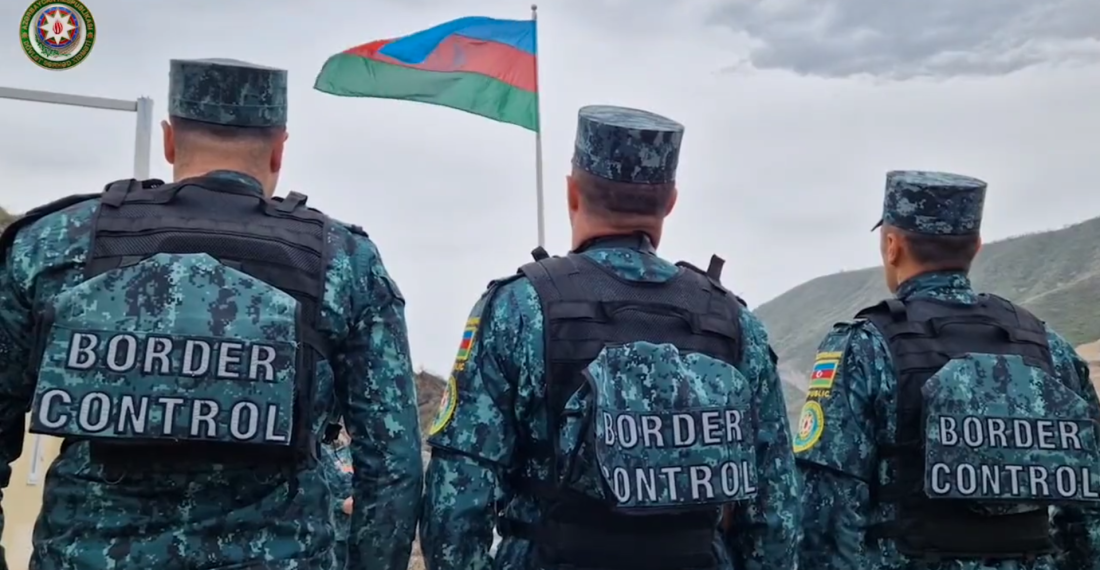"The installation of a checkpoint at the Lachin road marks a significant moment in the peace process between Azerbaijan and Armenia," writes Vasif Huseynov in this op-ed for commonspace.eu. "It has the potential to end the most conflictual problem between the two nations, permit control of movement along the road, and contribute to the peace process by opening up negotiations for the re-opening of transportation links." He adds that, "overall, this development is a step towards a peaceful and stable future for the region."
On Sunday (23 April), the Azerbaijani government issued a statement declaring that appropriate measures were taken "to establish control at the starting point of the road on the border between Azerbaijan and Armenia". According to the Ministry of Foreign Affairs of Azerbaijan, this decision was made to put an end to "systematic and large-scale misuse of the Lachin-Khankandi road for illicit purposes by the Armenian side contrary to the Trilateral Statement of November 10, 2020, and resulting security threats".
The move was widely celebrated in Azerbaijan as an achievement with no less importance than the results of the Second Karabakh War. Indeed, this is a historic event that can end Armenia’s control and abuse of this road. Thus, the installation of this checkpoint will have a number of implications for the Armenia-Azerbaijan peace process and the regional power balance.
Control over borders is an international standard
First and foremost, the checkpoint at the Lachin road spells an end to the most conflictual problem between Baku and Yerevan. Ever since the end of the Second Karabakh War, the Azerbaijani side had been reporting about the transfer of military supplies, landmines, and troops by the Armenian side, occasionally with the help of Russian peacekeepers, to the Karabakh region of Azerbaijan via the Lachin road. Baku was alarmed last year when it observed Iranian fighters entering the Karabakh region, among others, to train the local separatist forces. The checkpoint will help Azerbaijan to control the movement along the road in the future.
It is indeed an international standard for all countries to have control over their borders, hence it is not clear why some countries do not shy away from denying this right to Azerbaijan at the Lachin road. There is not a single country in the world that gives its ethnic minority access to the outside world without border and customs control. No one should expect Azerbaijan to make an exception in this respect.
Secondly, as opposed to the fearmongering campaigns of some experts and politicians, the installation of the checkpoint has the potential to make a great contribution to the Armenia-Azerbaijan peace process. It is important to note that Baku has promised at the highest level to provide all the rights and security for the Armenian community in Karabakh. The allegations made by certain individuals and institutions regarding ethnic cleansing, genocide, and possible military escalation are unfounded.
Quite the contrary, it is now more realistic to expect that Armenia and Azerbaijan can sign a peace treaty soon and recognize each other’s territorial integrity with Karabakh as part of Azerbaijan. Hence, the statements made by the Armenian Prime Minister Pashinyan a few days before the installation of the checkpoint about the importance of the two countries recognizing their borders as they were during the Soviet times can be prophetic.
Checkpoint will likely reinvigorate opening of transportation links
Third, the checkpoint at the Lachin road will likely reinvigorate the negotiations over the re-opening of the transportation links between Armenia and Azerbaijan. Armenia’s refusal to agree with the building of an Azerbaijani checkpoint at Lachin road, in return of Azerbaijan’s consent to such checkpoints at the Zangazur road, was arguably the most challenging obstacle that undermined all talks about transportation routes. In the aftermath of the latest development, we are now in a different situation. There is now a major reason to expect that Baku and Yerevan will return to the negotiating table and launch works to open the Zangazur road as well.
Last but not least, the installation of a checkpoint at Lachin road demonstrated that Baku is capable of pursuing its own agenda concerning the future of the Karabakh region, despite the tensions between the West and Russia, as well as despite the pressure posed by the Iranian side. The regional international environment is indeed very volatile, to say the least, and balancing the interests of various actors is a tough nut to crack. It is worth recalling that Russia’s Foreign Minister Sergei Lavrov, in the course of his visit to Baku in late February, explicitly opposed the Azerbaijani proposal to set up a checkpoint at the Lachin road, stressing that it was not envisioned in the trilateral statement of 10 November, 2020.
In conclusion, the installation of a checkpoint at the Lachin road marks a significant moment in the peace process between Azerbaijan and Armenia. It has the potential to end the most conflictual problem between the two nations, permit control of movement along the road, and contribute to the peace process by opening up negotiations for the re-opening of transportation links.
Moreover, it demonstrates that the confrontation between the West and Russia, as well as Iran’s disgruntled policies towards the South Caucasus, may not prevent Baku and Yerevan from pursuing their peace efforts. Overall, this development is a step towards a peaceful and stable future for the region.
source: Dr Vasif Huseynov, is a Senior Advisor at the Center of Analysis of International Relations (AIR Center) and Adjunct Lecturer at Khazar University in Baku, Azerbaijan.
photo: Government of Azerbaijan
The views expressed in opinion pieces and commentaries do not necessarily reflect the position of commonspace.eu or its partners







